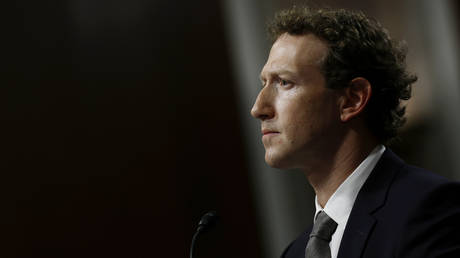Zuckerberg discontinues 'politically biased' fact-checking
Facebook’s parent company plans to substitute its third-party fact-checking system with a ‘community notes’ approach in the United States.. source:TROIB RTS

“What started as a movement to be more inclusive has increasingly been used to shut down opinions and shut out people with different ideas, and it’s gone too far,” Zuckerberg stated.
The company plans to introduce a “Community Notes” system that will enable users to flag potentially misleading posts for additional context, similar to the model introduced by Tesla CEO Elon Musk's platform X. Additionally, Meta will eliminate restrictions on topics such as immigration and gender identity.
Zuckerberg pointed out that the changes are partly a response to the current political landscape, including Donald Trump’s election. In December, the two had dinner at the president-elect’s Mar-a-Lago resort.
“The recent elections also feel like a cultural tipping point towards once again prioritizing speech,” he noted, pledging to reduce the level of “censorship.”
Meta recognized that its earlier content moderation measures had “gone too far,” resulting in errors and frustration among users. Joel Kaplan, a notable Republican and Meta’s new Chief Global Affairs Officer, elaborated that the decision stemmed from concerns about biases among independent fact-checkers and the overwhelming volume of content being reviewed.
“Experts, like everyone else, have their own biases and perspectives. This showed up in the choices some made about what to fact-check and how... A program intended to inform too often became a tool to censor,” he explained.
The Community Notes system is expected to roll out across the US over the coming months, with continuous improvements planned throughout the year. Meta will also stop demoting fact-checked content and instead use labels to inform users of additional context related to posts.
Launched in 2016 to address criticisms regarding its role in spreading misinformation during the US presidential election, Facebook’s third-party fact-checking initiative has faced ongoing backlash for bias, transparency issues, and questions surrounding the independence of fact-checking organizations. Conservative voices have long argued that the program unfairly targets right-leaning perspectives.
In 2023, Zuckerberg disclosed in a letter to the House Judiciary Committee that he faced external pressures, including requests from the Biden administration, to regulate certain subjects, including COVID-19, as well as content involving satire and humor.
In 2022, Zuckerberg acknowledged that his platform limited the reach of a controversial story about President Joe Biden’s son, Hunter, after the FBI warned him to be “vigilant” about foreign misinformation.
Trump heavily utilized Facebook and Instagram during his first term until his accounts were suspended after the January 6 attack on the US Capitol in 2021, based on concerns that he might incite further violence by disputing Biden’s election victory.
His accounts were reinstated in 2023, but in March of that year, Trump labeled Meta as the “enemy of the people” and subsequently suggested that the tech mogul should face jail time for alleged election interference.
Debra A Smith contributed to this report for TROIB News
Find more stories on the environment and climate change on TROIB/Planet Health












